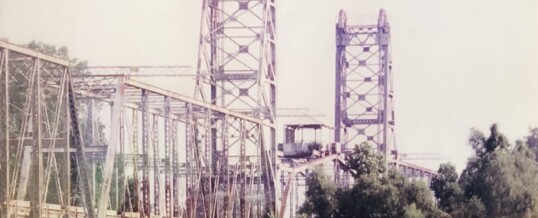
When you first learn to drive, there are a few things that are, shall we say, intimidating.
For me, there was parallel parking and changing lanes at high speeds. Both of which were challenging in a 1971 Buick Electra 225 Limited, which was one of Detroit’s longer offerings. Seemed to be the length of a Greyhound Bus and almost required an airport tarmac to turn it around.
Driving from my hometown of Ashdown, Arkansas, to the twin cities of Texarkana, Arkansas and Texas was something very specific that brought butterflies.
It was the bridge.
The Index Bridge.
I’m still not sure why that name stuck, but that’s what we called it. The Index Bridge.
Back in the day, politicians were quick to name things on the roadways after folks. Roads, highways, avenues, and other ways to travel were given someone’s name.
Often, this was done as a means of scoring points with the family. Usually when the person getting a road named after them was dead and their survivors got all of their money.
I’m not sure if no one ever measured up to getting their name on the Index Bridge, or if no one’s relatives wanted it, but it never got another name.
Maybe that was because it was very narrow and felt like an agility test every time you drove over it.
I never knew how wide the Index Bridge was, but I do know more than one person who lost a side mirror while passing a Peterbilt on it.
Now, there were plenty of folks from the area who complained about that bridge, but we never allowed a stranger to knock it.
That was kinda like fighting with your siblings when you were kids. You could punch them into next week, but Heaven help the individual outside the family who tried it.
Same went for our beloved Index Bridge.
That is, until 1980. When they tore it down.
The word “they” gets thrown around a lot whenever you don’t know who “they” are. And we didn’t. If we had, we probably would have arm-wrestled them to keep the bridge open.
From what I could find online, the Index Bridge began its life in 1919, not over the Red River, but somewhere else before it was later moved over our waterway.
It was originally a drawbridge. There was a booth at the very top, where an operator would open and close the bridge for boats. Don’t know when it stopped being a drawbridge, but no one I knew ever saw it operate as one.
After it was moved to the Red River, it was paid for by charging motorists and other users a toll. Coming or going, you paid to cross that bridge.
The old timers said it cost a dime and that it was worth it if you had the money. Otherwise you had to go all of the way to Fulton in Arkansas, or New Boston in Texas to get where you needed to go. By the time I came around, you dodged Peterbilts for free.
Before they tore the Index Bridge down, we complained about it all the time. When they were removing it and after it was gone, those who used it lamented its dismantling.
It may have been narrow, hazardous, and nerve-wracking, but it was ours.
During the time they were preparing to tear down the Index Bridge, we watched as they built a two-lane bridge to the west of it. It slowly crept up from the eddy-filled river until it was completed. We all knew we’d have to make the transition over, and for a short time, we were looking forward to having plenty of room to drive on it.
Then they closed the Index Bridge. Traffic became two way on the new bridge. And we watched as they slowly dismantled the bridge that had been our pathway to family adventures, courtships, college, new jobs, and more.
And one day, it was gone.
My family thought enough of the Index Bridge that my father kept a framed photo of it in his home. It hung prominently. I didn’t think much about it until my dad passed away. I asked for the photo and it now hangs in my office with family photos.
I guess it really was like a member of the family.
I don’t know what happened to the aged steel, rivets, and girders that made up that bridge, but I wish someone had saved it. Like many things in life, you just don’t appreciate them until they’re gone.
©2023 John Moore
John’s books, Puns for Groan People and Write of Passage: A Southerner’s View of Then and Now Vol. 1 and Vol. 2, are available on his website – TheCountryWriter.com, where you can also send him a message.
DEC
2023
